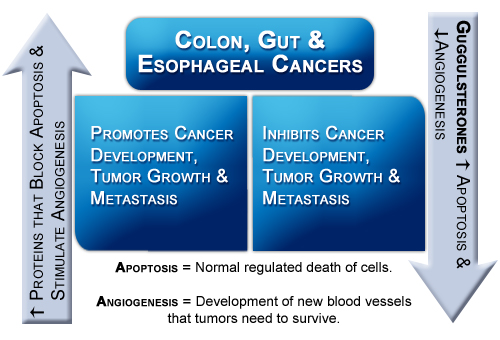Guggul Potent Against Colon, Esophageal and Gut Cancer Cells

Results from a number of lab studies have demonstrated that guggul has properties that discourage the development of various cancers of the digestive tract. Additionally guggulsterones inhibit the growth of cancer cells and block factors that promote the ability of cancer to spread.

Tumor-Preventing Effects
The Caudal-related homeobox 2 (CdX2) is an amino acid induced by bile acids that plays a role in cell development in the intestine. Dysregulation of CdX2 can trigger the growth of tumors in the gut, including adenocarcinoma. Recent lab studies in Japan suggest that guggul may be used to inhibit over-expression of CdX2 and prevent development of or growth in these types of cancer. When bile acids were applied to adenocarcinoma cells from the gut, the cells expressed more tumor-promoting CdX2. These levels were subsequently reduced after treatment with guggulsterones.45
Similar anti-cancer effects of guggulsterones have been observed in Barrett’s esophagus (BE), a condition characterized by the transformation of normal esophageal cells into intestinal cells. BE is a known risk factor for esophageal adenocarcinoma, and is believed to be triggered by increased stomach acids from acid reflux mixed with bile acids. When these BE cells then lose their cell-cycle mechanisms that cause their normal death (apoptosis), BE can transform into cancer in the esophagus.46
In the case of BE, guggulsterones reduced cell proliferation by activating caspase 3, a protein that promotes apoptosis. Interestingly, the level of farnesoid X receptors (FXR)was noted to be far higher in BE cells than in normal esophageal cells. FXRs are proteins known to be activated by bile acids but inhibited by guggul. Studies suggest FXRs may play a role in apoptosis, leading the researchers to suggest that the guggulsterones may be able to block the anti-apoptosis effects of FXRs as well.46

Anti-Tumor Growth and Anti-Metastasis Effects
Still other laboratory studies indicate that one of the two forms of guggulsterone exhibits potent anti-tumor effects against colon cancer cells. In addition to inhibiting cancer growth, guggulsterone-Z blocked the expression of proteins (e.g., VEGF and STAT3) known to promote metastasis in colon cancer.47




